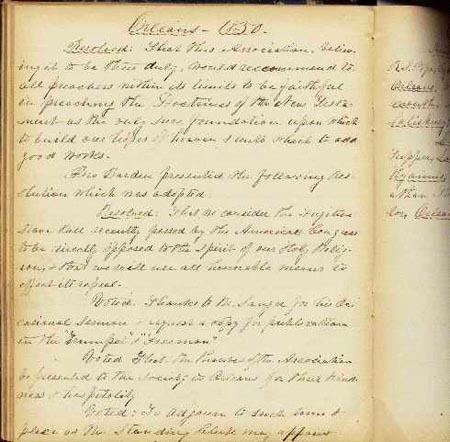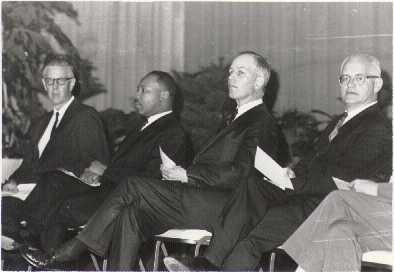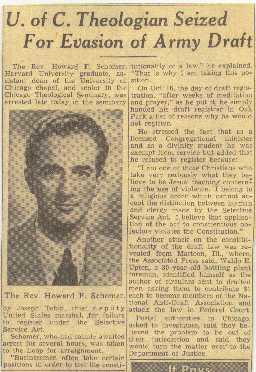Reflections of Public Ministry at Harvard Divinity School
An Exhibit of Manuscripts and Special Collections at Harvard Divinity School Library
The original exhibit, which opened March 11, 1999, was designed and arranged by Tim Driscoll, formerly of the Manuscripts and Archives Office of Harvard Divinity School Library, with the cooperative assistance of the Librarian and Public Services Office of Harvard Divinity School Library and the Information Technology Services Office of Harvard Divinity School. Special thanks to the following members of the community for their contributed talents and efforts: Doris Freitag, Wolfgang Freitag, Tom Jenkins, Charles Willard, Molly Ruggles, and Mark Russell.
A Microsoft PowerPoint presentation created by Molly Ruggles with the assistance of Gloria Korsman, Drew Daley, Ben Rota, Jon Stokes, Jian-Tong Xia, Heather Reid, Sara Smolik, and Tim Driscoll accompanied the exhibit. This web version of the exhibit was created by Clifford Wunderlich from the PowerPoint presentation.
For more information about the exhibit or about the manuscripts and archives collections at Harvard Divinity School Library, please contact Research Services.
Abolition
New England Ministers Resolve to Oppose the Fugitive Slave Act, 1850
An 1850 amendment to the Fugitive Slave Act of 1793 included a provision mandating the return of fugitive slaves. About nine hundred fugitive slaves, of an estimated ten thousand, were returned under the 1850 act.
This resolution of the Barnstable County Association of Universalists was signed by several prominent New England area abolitionist ministers. The ministers resolved that the 1850 amendment was "directly opposed to the spirit of our holy religion" and that they would "use all honorable means to effect its repeal."
Civil Rights
Selma to Montgomery, 1965
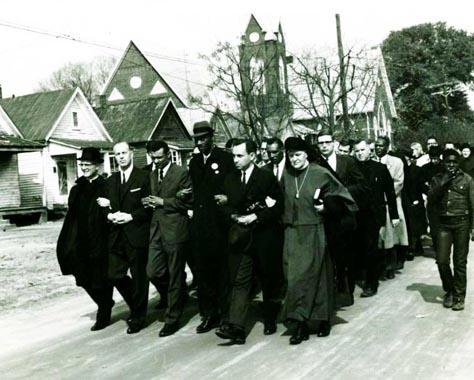
In March 1965, the Reverend Dana McLean Greeley (second from left), Unitarian Universalist Association President, joined other American religious leaders in civil rights marches in Montgomery, Birmingham, and Selma, Alabama. Reverend George McClain is in the second row, far right (with glasses). [Photo: bMS 15033/2 (2)]
The marches, prompted by Martin Luther King, Jr., protested violence against African American and other civil rights activists in Selma.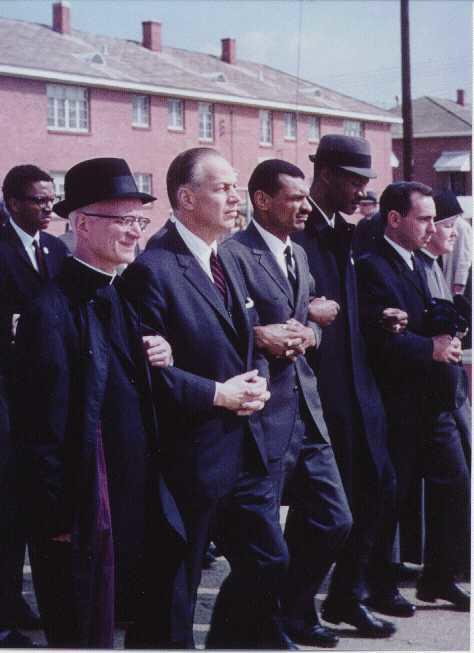
Days before this photograph was taken, an attack on three Unitarian Universalist ministers in Selma left one of them, James Reeb, dead.
The Ware Lectures, 1966
Martin Luther King, Jr., Dana McLean Greeley, and Homer Jack, director of the Unitarian Universalist Association Department of Social Concerns, at the 1966 Unitarian Universalist Association General Assembly in Hollywood, Florida. Dr. King delivered the Ware Lecture to this annual denominational assembly.
King, Greeley, and Jack had walked together in the 1965 Selma to Montgomery civil rights march. Dr. Greeley's tenure as president of the Unitarian Universalist Association included a major—and controversial—civil rights focus throughout the 1960s.
Violence in Jackson

Donald Thompson, minister of the First Unitarian Church of Jackson, Mississippi, was shot and gravely injured outside of his home on August 22nd, 1965. The attack followed telephone threats on his life, threats stemming from his efforts to integrate his congregation in Jackson.
Thompson moved to Jackson to establish a civil rights ministry. In addition to his congregational work, he also was one of the founders of Jackson's coffee fellowship, a weekly discussion group that brought together both white and black ministers and lay people.
Peace Ministries
Channing's Sermon on War, 1816
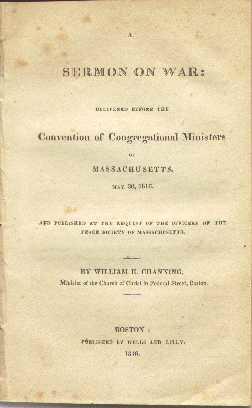
William Ellery Channing, minister of the Federal Street Church in Boston, formed the Peace Society of Massachusetts on December 28th, 1815. The foundation of this organization emanated from Channing's earlier work with a group of Congregational ministers to better inform public perception of the brutality of war.
Channing often used his sermons to express his opposition to the War of 1812. Here, he details typical horrors and miseries of war and notes a contradiction between public damnation of isolated violence and public acceptance of the "idea of human beings employing every power and faculty in the work of mutual destruction."
Congregational Petitions for Amnesty
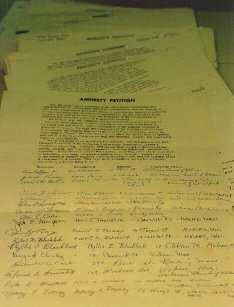
Throughout the twentieth century, many American denominations have operated educational and support programs for conscientious objectors to help frame the argument that objection is a moral alternative to the selective service.
The petitions shown here were signed at numerous congregations to supplement a 1973 Unitarian Universalist General Assembly resolution and to call on the U.S. Congress to provide universal amnesty "in the spirit of pride in the moral conscience of its [members]."
Draft Resistance, 1940
On October 16, 1940, Howard Schomer, a minister of the United Church of Christ, reported to his draft board in Oak Park, Illinois, to declare his conscientious objection. The draft automatically exempted ministers and divinity students from service upon registration but did not give them the opportunity to enlist as conscientious objectors. Schomer was arrested by U.S. Marshals one month later for his protest action. The Illinois Selective Service Board changed their policies soon after, however, and Schomer enlisted as a conscientious objector. He performed alternative service through the American Friends Service Committee.
Paul Tillich's Voice of America in Germany, 1942-45
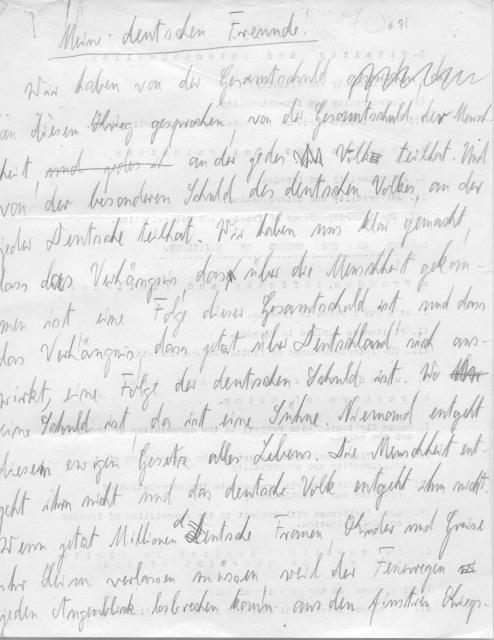
Paul Tillich, German theologian and chaplain to the German army in World War I, emigrated from Germany in 1933, as Nazi ideologies became prominent.
Shortly after the United States joined the Allied effort in 1941, the U.S. Office of War Information asked Tillich to write Voice of America addresses to the German people. More than one hundred of Tillich's drafted addresses were broadcast to the German people between 1942 and 1945 urging Germans to recognize the injustice and cruelty of Hitler's regime and the need for the "True Germany" to resist him.
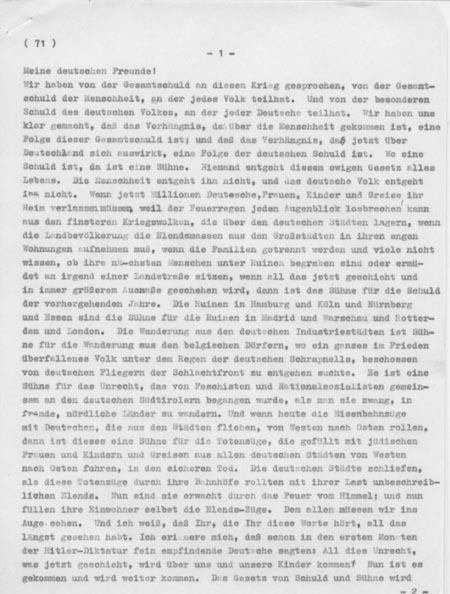 |
|
Typed Transcription.
|
Suffrage and Equal Rights
Preaching on the Biblical Place of Women and Men
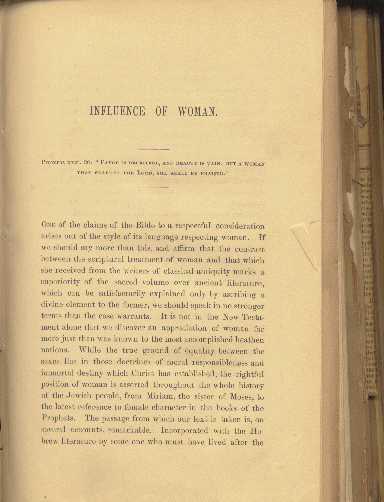
Ezra Stiles Gannett, Channing's assistant and eventual successor at Federal Street Church, continued Channing's explorations of theological positions about social equality among races and among men and women.
In this 1857 sermon, Gannett stated, "While the true ground of equality between the sexes lies in those doctrines which Christ has established, the rightful position of women is asserted throughout the whole history of the Jewish people, from Miriam (Moses' sister) to the books of the Prophets."
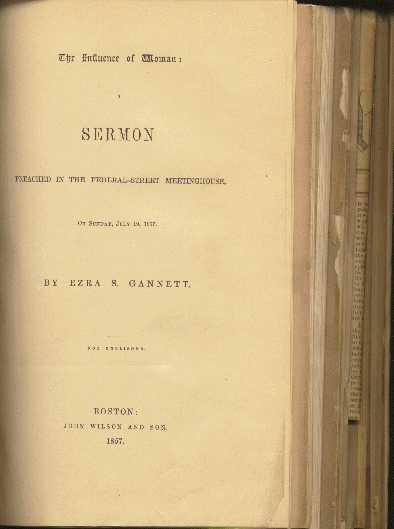
Reverend Olympia Brown
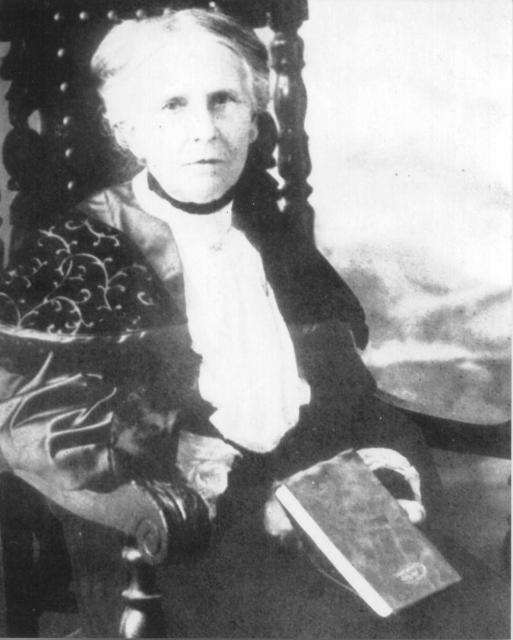
In June 1863 at the St. Lawrence Association of Universalists (New York), Olympia Brown became the first woman ordained “with full denominational authority” by any denomination in America.Brown would serve in Universalist congregations throughout the nation, including Connecticut, Massachusetts, Ohio, and Wisconsin.
A staunch advocate of women’s rights, Brown co-founded the New England Woman’s Suffrage Association in 1868. While in Wisconsin, she served as president of the state Woman Suffrage Association for twenty-eight years. She was also vice-president of the National Woman Suffrage Association.
Another woman, Antoinette Brown Blackwell, was ordained a Congregational minister on September 15, 1853, but the ordination never received the authoritative support of the Congregational General Conference. (See Susan Hill Lindley, You Have Stept Out of Your Place: A History of Women and Religion in America, Louisville, Kentucky, Westminster John Knox Press, 1996.)
Temperance
The Temperance Movement
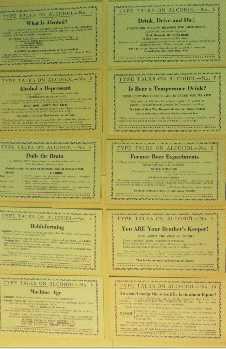 Temperance has been a consistent tenet of American religions since the colonial period. Numerous ministers in numerous denominations regularly have addressed the theme in sermons and writings.
Temperance has been a consistent tenet of American religions since the colonial period. Numerous ministers in numerous denominations regularly have addressed the theme in sermons and writings.
The Unitarian Temperance Society published hundreds of pamphlets and informational brochures to inform public opinion about the place of alcohol in society. The cards on this page were printed probably just as American Prohibition was repealed.
The Unitarian Temperance Society published hundreds of pamphlets and informational brochures to inform public opinion about the place of alcohol in society. The cards on this page were printed probably just as American Prohibition was repealed.
Community Action and Influence
George La Piana and Felix Frankfurter
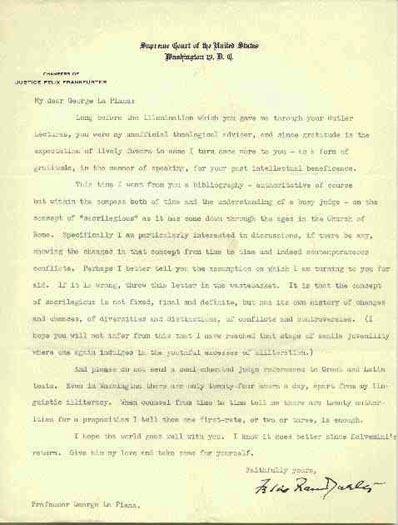
Professor George La Piana, Morison Professor of Church History at Harvard Divinity School from 1926 to 1948, was born in Italy and ordained a Catholic priest in 1900. He came to the United States in 1913 and began teaching at Harvard in 1916. La Piana was a leading figure in the modernist controversy in the Roman Catholic Church in the early 20th century.
This correspondence to La Piana from Supreme Court Justice Felix Frankfurter reveals the informal role of counseling between the friends and the intellectual connections between theology and jurisprudence. In the letter, Frankfurter asks La Piana for a summary of the historical progression of the social understanding of the word "sacrilege.
Jordan Neighborhood House, Suffolk, Virginia

Founded in 1897 as a Universalist mission, the Suffolk, Virginia, mission provided education and health care to the African American inhabitants of the area. It was renamed the Jordan Neighborhood House in 1939 in honor of Joseph Fletcher Jordan who served as minister from 1904 to 1929.
With the support of the Universalist Church of America and the Association of Universalist Women, Jordan Neighborhood House later offered counseling for mothers, pre-natal and infant health clinics, and music programs for teenagers.



